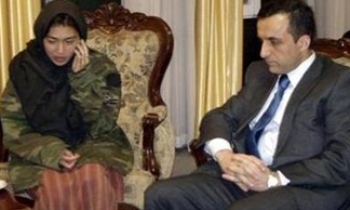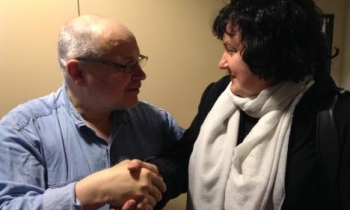(AP) Tens of thousands of Lebanese _ men and women, Christians and Muslims _ shouted insults at Syria on Wednesday in an outpouring of anger as yet another assassinated anti-Syrian campaigner was buried.
Lebanon was brought to a halt by a general strike called in mourning for editor and lawmaker Gibran Tueni, who was killed along with two bodyguards Monday in a car bombing, but neighboring Syria largely ignored the events. Damascus has denied involvement in the slaying.
Doctors, nurses, bankers and businessmen joined political activists and students to bid farewell to Tueni, the outspoken 48-year-old general manager of the country's leading An-Nahar newspaper.
"We want to say the truth; Syria killed him!" shouted many among the flag-waving crowd outside An-Nahar's building in Beirut. "Gibran lives on!" shouted others.
"Enough blood and killings. They (Syrians) are taking away our best men in Lebanon," said an enraged Mazen Abdel-Samad, a 25-year-old university student wearing the red and white scarf that came to symbolize Lebanon's uprising against Syrian control.
Anti-Syrian groups in Lebanon are counting on public anger over Tueni's killing to push for ridding the government of remnants of the Syrian era _ including intelligence operatives _ and to close ranks in confronting Damascus.
But their choices are limited. The anti-Syrian groups are divided and, although they hold a majority in Parliament and Cabinet and are in control of the police, they have not been able to stop the bombing campaign.
Pro-Syrian President Emile Lahoud has rejected their calls to resign, and efforts to remove him have been stymied by disagreements.
Arab League Secretary-General Amr Moussa came to Beirut on Wednesday in an effort to prevent further deterioration in Lebanese-Syrian relations, and said he hoped diplomacy could "contain the grave situation."
Moussa goes to Damascus on Thursday, then will return to Beirut.
Police officials estimated the crowd Wednesday at more than 100,000 people. But other witnesses and observers said they thought it could be as high as 200,000.
The protest and funeral was by far the largest gathering since March 14, when 1 million people filled Beirut's streets to demand that Syria release its hold on Lebanon. In a speech that day, Tueni called for the withdrawal of Syrian forces from Lebanon and urged Lebanese Muslims and Christians, often divided along sectarian lines, to unite.
Syria withdrew its soldiers from Lebanon in April.
Tueni was the fourth prominent anti-Syrian figure to be killed since a series of bombings began in February with the assassination of former Prime Minister Rafik Hariri. A previously unknown group claimed responsibility for Monday's bombing, but Tueni's colleagues and political allies blamed Syria.
While pictures from the funeral were broadcast on Arab and international television stations, Syrian state television ignored the ceremony.
The strike called by anti-Syrian groups in Lebanon was widely observed. But in some eastern regions where pro-Syrian Shiite groups Hezbollah and Amal dominate, the strike call was ignored.
Still, a Cabinet crisis was looming after Hezbollah and Amal, the main Shiite Muslim groups, walked out to protest Prime Minister Fuad Saniora's request Monday to the United Nations for an international probe into the killings and for a tribunal in the Hariri assassination.
The Bush administration endorsed Lebanon's call for a broader U.N. investigation and suggested the Security Council might consider tough sanctions on Syria if its resolutions designed to reverse its influence in Lebanon were disregarded.
In order to maintain an international spotlight on Syria and its need to cooperate, State Department spokesman Sean McCormack said, "We think it is very, very important that the council act to extend the mandate of this investigation."
Syria already has been accused of involvement in Hariri's murder, although Damascus denies this. A U.N. investigative team said it had evidence that Syrian and Lebanese intelligence played a role in the killing and Syria has been slow to cooperate in the probe.
In a special session of parliament, Tueni ally Akram Shehayeb told the assembly: "The equation is clear. He who gives orders is in Damascus. The executioner is here in Beirut."
In the Christian district of Ashrafieh, which Tueni represented in parliament, several thousand people marched behind the coffins of the lawmaker and his two bodyguards, wrapped in the national flag of red and white stripes with a green cedar tree.
The pallbearers rocked the coffins, a traditional sign of deep grief, as they made their way slowly through the crowds along several miles of streets. Residents showered the coffins with rice from balconies as the procession passed through Gibran Tueni Square, named after Tueni's grandfather, who founded An-Nahar in 1933, and headed to downtown Beirut.
A giant portrait of Tueni hung from the side of the An-Nahar office building, and hundreds of Lebanese troops and police took up positions in a facing square, where protesters gathered. The crowd waved Lebanese flags and held Tueni's picture, or those of Hariri and another An-Nahar journalist killed in a June bombing, before the procession moved to a nearby square and St. George Cathedral for a prayer service.
Many shouted insults against Syria, its President Bashar Assad and his Lebanese ally, President Lahoud.
"Listen Syria, you can take our lives but you can never take our freedom," read one banner.
"The rooster of An-Nahar is stronger than you, Baathist dogs," read another, referring to An-Nahar's emblem and Syria's ruling Baath party.
Saniora, politicians and dignitaries filed into St. George Cathedral, its bells tolling in mourning.
Mourners inside and outside the church, many weeping, then broke into applause as Tueni's father, An-Nahar publisher Ghassan Tueni, spoke: "No to revenge, no to hatred and no to bloodletting," he said, calling for Muslims and Christians to unite. "Let us bury with Gibran all the hatred."
After the prayer service, the convoy of coffins made a stop at the central Beirut gravesite of Hariri before the three were buried in the Ashrafieh cemetery.









